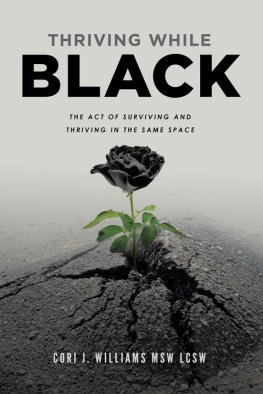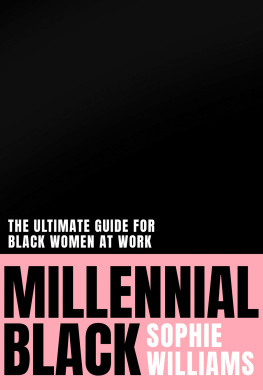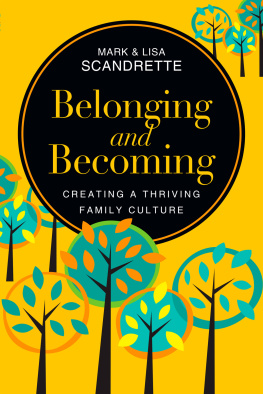ACKNOWLEDGEMENTS
T here are many people that I wish to acknowledge that have contributed to my success. First, I would like to thank my Lord and Savior Jesus Christ for granting me the wisdom and courage to relentlessly pursue the path that I am on and for fueling my dreams of success. I would like to thank my best friend, my brother Shaun F. Williams, who has always been in my corner and been my biggest cheerleader since day one. His passing in November of 2018 has by far been the most hurtful experience that I have ever endured. I often sit and reminisce about the many conversations that he and I would have about our dreams and aspirations.
His words continue to resonate within me until this very day. He would always tell me, Cori, dont stop dreaming, and make sure your dreams are so extraordinary and so out of this world that the average mind will never be able to comprehend your viewpoints. My family has always been supportive of all my endeavors. My mother, father, sister, and brother were instrumental in shaping my ideology early in life. We may not have been rich in financial wealth, but we were rich with unconditional love and support.
Lastly, I would like to thank the following people who have directly and indirectly had a positive influence in my life and continue to inspire me until this very day.
Family and those that continue to inspire me:
Anika Moore-Williams (wife), Robert & Delores Williams, Minnie Williams, Feleascia Bridges, The Bowden & Joseph Family, The Shaw Family, The Moore Family and Perkins Family, Jacqueline Wilson LMHC, Dawn Carew, Shamolie Wyckoff MD, Tasmia Henry MD, the Trosclair Family, The entire Williams Family. Kirsten Williams, Diamond Williams, Dj & Deshaun Williams, Claudette Brown, Thomas and Skye Mattison, Kaitlyn, To my brothers Robert (Pete) Paige and Jeff Duffy.
To my greatest inspirations, my children Kayla Williams and Cori Williams Jr.
My Fathers Uplift Inc. Family:
Dr. Charles Clayton Daniels Jr. LICSW, Samantha Fils LCSW, Lakisha R. Austin MBA LICSW, Leonard Tshitenge, George Boakye-Yiadom
Friends:
Jordyn Seide, David Rainer, Mr. & Mrs. Terry Gresham, Mr. & Mrs. Xavier Fairley, Mr. & Mrs. Carl Brown, Janna Ayoub, Annie Canuto
Dedication:
In the memory of my big brother Shaun F. Williams.
INTRODUCTION
T hriving While Black sets out to explore the psychological and emotional consequences of being Black in corporate America.
From the start, Black people have been discriminated against and excluded based on their skin color. The dehumanization of Black people during slavery is but a shackle that still lies in the background, sneaking up on them and creating the question of where their place is in America.
There still exists a belief that white people are better than Black people and Black people are not equal to white people. There seems to be an unwritten law in America that seeks to ensure that Black citizens remain at the lower rung of the social ladder. Thus, the progression higher up the social ladder reveals the presence of fewer African Americans because they are regarded as the minority. So, even when Black people get top-class qualifications or give their best, it most often does not translate into getting access to the spheres of influence because they are scarcely seen as deserving.
According to a study by Stokely Carmichael and Charles Hamilton in the 1960s, there exists persistent Black inequalities in the structural makeup of America. An average white person, regardless of motivation and behavior, benefits from social structures and organizational patterns that have continually put the average Black person at a disadvantage.











